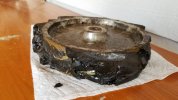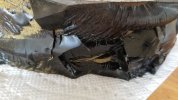- Joined
- Nov 28, 2011
- Messages
- 287
The 4" rubber contact/drive wheel on my KMG horizontal grinder is turning soft and falling apart. With only moderate pressure, my fingernail can dig out pieces of the softened rubber, from both the wide "contact" surface and the narrow surface exposed at the top of the aluminum hub. This is the second KMG supplied wheel to fail in this way after about five years.
I have other rubber contact wheels that have not deteriorated in this way - the small wheels for the horizontal grinder supplied by KMG about ten years ago; large and small rubber contact wheels from Bader that are 40 years old; and an AMK wheel that's about 4 years old. (The 40 year old Bader wheels have gotten hard, but are still usable)
KMG had this to say "........The rubber on your wheel is a natural product, and under some conditions (largely environmental) it can become devulcanized and degrade.The primary agents that cause rubber and plastics to deteriorate are radiation, high humidity, high temperature, oxygen and pollutant gases, and stress and other direct physical forces. It doesn't surprise me at all that two wheels have done the same thing in your shop -- same environmental conditions. Here in our shop we store our small wheels in a container that is treated to help preserve them............."
I do live in a sub-tropical climate about 20 km from the sea with high heat most of the year and high humidity during the rainy season.
I don't believe the degradation is due to use, or abuse. The direct drive motor is 1725 rpm max, run off a VFD at low speeds. I'm not a production shop. The only direct grinding I do on the contact wheel is final profiling of the inside surfaces of folder springs - no heavy grinding.
Has anyone else had a similar experience?
Saludos
J


I have other rubber contact wheels that have not deteriorated in this way - the small wheels for the horizontal grinder supplied by KMG about ten years ago; large and small rubber contact wheels from Bader that are 40 years old; and an AMK wheel that's about 4 years old. (The 40 year old Bader wheels have gotten hard, but are still usable)
KMG had this to say "........The rubber on your wheel is a natural product, and under some conditions (largely environmental) it can become devulcanized and degrade.The primary agents that cause rubber and plastics to deteriorate are radiation, high humidity, high temperature, oxygen and pollutant gases, and stress and other direct physical forces. It doesn't surprise me at all that two wheels have done the same thing in your shop -- same environmental conditions. Here in our shop we store our small wheels in a container that is treated to help preserve them............."
I do live in a sub-tropical climate about 20 km from the sea with high heat most of the year and high humidity during the rainy season.
I don't believe the degradation is due to use, or abuse. The direct drive motor is 1725 rpm max, run off a VFD at low speeds. I'm not a production shop. The only direct grinding I do on the contact wheel is final profiling of the inside surfaces of folder springs - no heavy grinding.
Has anyone else had a similar experience?
Saludos
J






